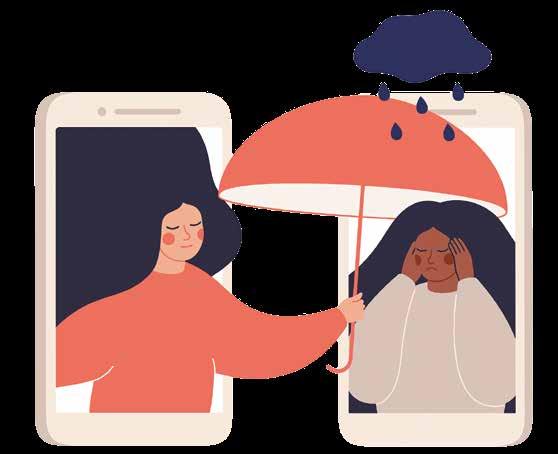
17 minute read
Ask the Expert
teaching each other how to heal
Ask the Expert
Advertisement
We'll feature an expert in the mental health and/or substance use disorder fields to answer questions
George Lewis, CEO, Author and Motivational Speaker
I am extremely proud of my professional staff and the many products, services and resources. we provide substance use treatment, education, therapy and mental health professionals and their patients, clients and students.
motivationalconsultinginc.com
QWhat does "bami soro" mean, and how can it be helpful for people in recovery?
In the Yoruba language of the West African ancestors of many Black Americans, bami soro means “talk to me,” in a way that’s soulful, honest, and deep. The first step in any effective therapy or counseling situation is to establish a relationship where that kind of talk can happen. It requires a degree of mutual understanding and respect. But if you work in the field of substance use as a therapist, counselor, or teacher, there’s a better than even chance that you’re White and that many, or most of, your clients are not White. In this country, that means that your clients’ experiences don’t overlap yours nearly as much as you might believe—even if you come from similar economic backgrounds and have dealt with substance use yourself. This racial divide can make it hard to establish mutual understanding and connect on an intimate, honest level. This is especially true when you consider:
The legitimate need to preserve professional boundaries. The huge empathy gap between most White and Black people in America due to their different experiences of the world, and consequently their different frames of reference. The fact that racial issues can be so emotionally loaded that many professional helpers avoid talking about them, even if that means that Black clients never get to deal head-on with aspects of their personal histories that could undermine or block their recovery. The importance of not allowing clients’ past traumas or crises to become excuses for not doing the work of recovery.
As a key tool in Culturally Directed Motivational Healing, Bami Soro helps the helping professional motivate clients, patients, and students by discussing crucial topics with them to help bridge the gap caused by their social, cultural, and historical differences. Q What are some key things that a professional can do to bridge the cultural divide when working with a client from a different cultural background?
Establishing rapport is not easy. If you are working with Black Americans, the next step after laying the groundwork of respect is to acknowledge the racial and cultural situations they face, so you can start and sustain conversations essential to your client’s recovery. The success of your work rides on these first two steps, so that’s where Bami Soro focuses.
To achieve that, we ask questions and share stories that speak directly to topics they’re intimidated by or leery of because they assume—usually correctly—you won’t understand. Opening up these topics is key to giving the people you serve the best possible chance to recover and thrive.
Bami Soro isn’t about political correctness. It’s about exploring key aspects of the Black experience in America. This goes a long way toward setting the stage for honest discussion and helps members view you apart from the system they distrust.
QHow does Black culture play a role in both addiction and recovery?
Black Americans tend to drink at a somewhat lower rate than White Americans across most age groups but use drugs at remarkably similar levels. Yet Blacks are arrested and suffer legal problems from drinking and drug use to a much greater degree. They also have higher rates of social and health problems, at least partly because of racial disparities in poverty rates. Poor neighborhoods have easier access to alcohol and drugs and less access to good health care. There is also a paradox in traditional Black culture that can help protect against heavy use of drugs and alcohol yet worsen some of their consequences. For instance, heavy alcohol use is culturally frowned upon in Black social society. But when Black people do drink heavily, their loved ones are often less likely to intervene. This may be due to a strong culturally based distrust of the medical establishment, at least in low income neighborhoods.
This distrust extends to treatment programs because they’re considered part of the medical establishment unless they have a prominent faith-based component. Blacks between the ages of 12 and 25 are less likely to need specialty treatment compared to the same age group among other ethnicities. Black men 26 and older, however, are more likely to need specialty treatment. This may be because Blacks who drink heavily tend to start drinking later than other ethnic groups. Black women, on the other hand, are less likely to need treatment than women of other racial and ethnic groups (Source: PsycINFO Database Record (c) 2013 American Psychological Association). Q How does historical and present trauma impact the ability of Americans of African ancestry to recover?
Most “street codes” are unhealthy responses or unhealthy coping strategies developed to help make meaning of traumatic experiences. American clients of African descent who come from street culture have perpetuated these codes knowingly or unknowingly. The behavior’s origin connects directly to slavery— silence was the only power a slave had. Many slaves would suffer horrible atrocities, even death, without uttering a word or a sound in order to hold on to something they valued and deny slave owners the satisfaction of seeing them hurt. Today’s street code is that same ideology gone awry, in that Black Americans do have a voice, but many have been conditioned not to use it even when justice and safety are at stake, until they explode in violence turned inward on themselves and others who look like them.
Black men in the world of drugs and alcohol—especially those in impoverished communities—live with an undercurrent of violence that can erupt at any moment. Violence and other forms of social trauma can affect people up and down the socio- economic spectrum, but in poor communities they are part of daily life. To survive in that world requires denial—denial that the violence all around them will ever touch them personally, and denial that they will be deeply damaged if it does.
QHow can being of service support spirituality in recovery?
In the fellowship that I attend “service” is part of our symbol as a spiritual principle. Spiritual principles are amazing because you need only incorporate one into daily living and it will lead to others. You can’t be honest without developing integrity, you can’t develop integrity without developing commitment, and so on.
To truly recover from addiction, you must incorporate these principles into your daily life without compromise. It is important to understand that principles aren’t lived by convenience, but by commitment. People who honor them only when it’s easy or convenient keep their spirits weak and then their recovery is weak as well.
Living by spiritual principles strengthens the spirit. The more you feed them the stronger they get, and strong healthy spirits don’t do unhealthy things.
Don’t skate over that last point, because it’s important—healthy spirits don’t do unhealthy things because they don’t want to. That’s the beauty of it. Living by spiritual principles is self-reinforcing. The more you do it, the more natural it becomes.
Also, the stronger your spirit becomes, the more it appreciates being and staying strong. The more it recognizes how things were at your worst, the more grateful it is to have survived and become healthy again, and the more determined it is to stay healthy. A strong spirit is your ally, not your taskmaster.
QAs a black man, how has your own personal and professional journey helped other professionals in the field and people in recovery?
I am a person in long term recovery who has worked in the recovery community for over 20 years. Most of those years were spent delivering direct services to people of all ethnicities at a very vulnerable and troubling time of their lives. What struck me most was that all the information and experience I offered meant little if I could not translate what I knew in a way the person or audience I was trying to help could connect to, based on their own experiences. So, I focused on making those connections. And over time, I developed an empathetic, bridge-building, culturally sensitive communication style that served me well as a presenter, group facilitator, motivational speaker and author.
Bami Soro, which as mentioned before means “Talk to Me” in the Yoruba language of West Africa, represents my attempt to pass along this communication style. Its hallmarks are storytelling and eliciting personal stories on each topic from the participants themselves so that they, not the facilitator, do most of the heavy lifting. It’s the participants who “connect the dots” between their own experiences and each topic that’s up for discussion.
Support group participants and facilitators alike will find Bami Soro entertaining and informative. But its most important value to therapists, counselors and mental health professionals is that it helps those professionals with little or no experience, in communicating with Black Americans or people of color, begin to develop their own comfortable, confident communication style with clients from these communities.
Black counselors will also appreciate having a culturally directed tool to help guide their group discussions in ways that will make them more therapeutically effective for Black Americans and other people of color. But the fact is there are more young White therapists than Black therapists, counselors, behavioral health, and mental health professionals graduating every year, which means it’s impossible for people of color to always work with professionals who look like them. There are no reasons why White professionals can’t bridge this gap if they are willing to learn how to communicate effectively with Black Americans and other people of color and “meet them where they are.” Bami Soro helps them do that.
Looking on the Brighter Side of Things
This example suggests that more can be gained by focusing on our strengths, our connection to an encouraging person and having a specific plan for facing problems in our present life. Indeed, perhaps too much time is spent on dwelling on our past distress and not getting on with our lives. Indeed, misery may love company but risk-taking with support may bring us to greener pastures. This is the thinking of a relatively new field of psychology developed in the last twenty years that is showing a lot of promise and is supported by research. It’s called positive psychology. It’s a very hands-on, action-oriented psychotherapy whose focus is present day help for mood improvement and personal well-being. It does not ignore the miseries of our past life experiences but is a truly authentic methodology that focuses on the present and what can be done to be happy and fulfilled. It doesn’t deny the past but attempts to deal with the past in how it appears in our present life. It’s the epitome of a “can do” mentality. Its optimism is not naïve but is truly authentic. Best of all, research tells that it works!
This more hopeful modality emphasizes the profound importance of the therapeutic alliance between helper and helpee. Resistance to change is seen as worthwhile since it addresses what the hold-up in a person’s life is about. In this style, the client is the expert on himself and the helper is the catalyst for change, often by observing existing strengths in the helpee and suggesting specific suggestions that empower the client and enable the helpee to truly own his or her competency. In this methodology the client practices making corrections in his or her own life by first doing it with the helper and then outside the relationship with others. Often this type of therapy has a profound effect on the helper as well as the client. This method of change can be incorporated with other forms of professional help such as cognitive-behavioral therapy, somatic trauma therapy and psychodynamic therapy.
I like this change methodology because, based on the example above, I might enjoy seeing an old friend like Joe but would very much more prefer to get the help of someone like Mike who nudges me to get on with my life. As the old saying goes, “You catch more flies with honey than with vinegar.” This mentality is even more relevant today in our often-powerless pandemic age.
what research says about looking on the bright side
The benefits of positive psychology are actually quite remarkable even when you have lived through difficult life experiences. Being the starry-eyed optimist is a lot more life-saving than you would imagine. Clearly such views need to be authentic and based on real life personal victories. Research says that happier people live on average ten years longer than less happy people. Possibly this is due to the fact that happier people have stronger immune systems, lower blood pressure and better heart health, and they have more
MRC connects you with:

Recovery navigation | Peer support |
Volunteer opportunities Training and education | Sober social fun | And more!
Maria Ponomariova / iStock

successful marriages and favorable work experiences. Optimistic people also tend to focus less on their negative experiences and more on a feeling of gratitude for what they have in life. Even people with significant depression and trauma can lessen their symptoms more quickly by focusing on gratitude, personal forgiveness, self-compassion and a willingness to do small acts of kindness for others. Doing such behaviors changes our brain chemistry, helps us relax, improves our capacity to separate the past from the present and helps us grieve and live more in the present without judgment. We focus better when we are not living in our past.
Looking on the bright side is not the same as sugar-coating, which denies our past. No amount of sugar coating or denial of our past will sustain a happy life. Staying on the bright side means having an awareness of our darker life suffering but living less in that world. Oddly enough, having positive life experiences in the present actually facilitates our grief over past suffering and allows us to put such pain to rest. Brain studies verify many of these assertions. Good books to read on this subject are Why Good Things Happen to Good People (Broadway Books, 2007) by Stephen Post, Ph. D. and Jill Neimark and Hardwiring Happiness (Penguin Books, 2013) by Rick Hanson. We may not need research to tell us these things. Any one of us who has had an encouraging friend knows that miracles happen through the loving kindness of someone who truly accepts and cares for us.
“He is a wise man who does not grieve for the things which he has not but rejoices for that which he has.” epictetus
positive psychology skills
What the client sees as the problem is the starting point of help. In this modality, the client’s expertise on what helps is respected and gets aided by the helper’s suggestions in the collaborative relationship. Often these suggestions include building positive psychology skills whose efficacy is based on research. These skills may include: Body awareness and mindfulness, developing an attitude of gratitude, practicing acts of kindness, seeing the bigger picture, developing compassion for self and others, enabling personal forgiveness, recognizing a life purpose, witnessing strengths in self and others, cultivating trustworthy intimate relationships, and having a spiritual sense. Any one of these skills has been shown to increase serenity, relaxation, self-confidence and a resilient, positive mood. These benefits result from a change in brain chemistry and are long-lasting. Such positive results also allow us to process, grieve and resolve past suffering while dwelling less on past emotional wounds. The power of positivity in the hands of a skilled helper truly can facilitate miracles.
social context of looking on the bright side
We are living in very grim times due to the COVID-19 pandemic, political strife and economic hardship. Our news media has no idea of TMI — “too much information.” We are constantly exposed to the grim parts of life 24-7. You can only imagine how much anxiety our children feel when they are exposed to strife that is beyond their maturity level to handle. Especially when so many adults have become cynical and socially distrustful. So, what better time to learn how to look for the better side of things?!
Well I can tell you that one of the best kept secrets of life is that most people are very trustworthy. Nine out of ten are capable of real compassion. The ten percent of those who aren’t, are there to keep us on our toes, to protect ourselves, and be more forgiving. Most of us bring the better part of ourselves to others. If we keep our eyes open, we will sense the well-being that is all around us, even in these dire times. Most of us are naturally driven to lead fulfilling and meaningful lives in families We are all capable of bringing the better parts of ourselves to others (at least for the most part).
The dark side of ourselves – such as distrust, disdain, stereotyping, blame, and lack of trust we have in others – is more about ourselves than somebody else. The reason we do that is that we don’t want to look at ourselves. We have little faith to handle such truths. We find it easier to make excuses, become prejudiced and write people off. Sadly, all of us have a dark side, which we can learn to keep under check. That’s what makes us human
Continued from page 14
concrete first steps to practice positive psychology
A good place to start is learning more about your personal character strengths. I can recommend the VSI (Values and Strength Inventory) at www.viacharacter. org. Most of us are more prone to be critical of ourselves and focus on our shortcomings. Often our view of ourselves is inaccurate, dismissive or defeatist. It’s best to start with some accurate awareness of our good qualities, either through the VSI or asking trusted friends what they see as our assets. For now it is better to avoid making a list of your shortcomings and instead focus on your strengths and doing practical strategies to promote your well-being.
I recommend learning about the science of happiness. Two excellent, research-based resources on the science of happiness to start with are Authentic Happiness by Martin E.P. Seligman, Ph.D. (Simon & Schuster, 2002) and the authentic happiness website (www.authentichappiness.sas.upenn.edu) with its inventories to assess your level of happiness. I can also recommend The Myths of Happiness by Sonja Lyubomirsky, Ph.D. (Penguin Books, 2013). Her website (www. sonjalyubomirsky.com) is an excellent, researched study of what does and does not a make us happy. Her results are quite startling and illuminating. Should you want to get professional help with a positive psychologist you would be well-advised to visit www.psychologytoday.com and enter your zip code under “Finding a positive psychologist in your area.” You will find a number of profiles of reputable, licensed helpers specific to your area.
If you are looking for concrete strategies that should rather quickly brighten your mood today let me suggest three: 1. Do one small act of kindness each day for a week. 2.Write a letter of gratitude and send it in regular mail to one person who has made a positive difference to in your life. 3. Google Dr. Elvis Francois, a surgeon at Mayo Clinic, and listen to his podcast of him singing “Lean on Me” to his patients during the exhausting and dangerous work of COVID-19 medical care in the ICU. Not only is this a testimony of human generosity but his voice is out of this world.
If you do any of these activities, you will likely notice a change in your brain chemistry and your mood will be much brighter and stay that way for some time. Good luck with your efforts!
John H. Driggs, LICSW, is a Licensed Clinical Social Worker in private practice in St. Paul and co-author of Intimacy Between Men (Penguin Books, 1990). He can be reached at 651-699-4573.

suicide preVention 1-800-273-8255
crisis text line 741741

gambling hotline 1-800-333-4673









